Want to see London’s ‘shadow side’? Try cycling around the city as a woman
Some men seem to think it’s an invitation to belittle, harass, and intimidate

Your support helps us to tell the story
From reproductive rights to climate change to Big Tech, The Independent is on the ground when the story is developing. Whether it's investigating the financials of Elon Musk's pro-Trump PAC or producing our latest documentary, 'The A Word', which shines a light on the American women fighting for reproductive rights, we know how important it is to parse out the facts from the messaging.
At such a critical moment in US history, we need reporters on the ground. Your donation allows us to keep sending journalists to speak to both sides of the story.
The Independent is trusted by Americans across the entire political spectrum. And unlike many other quality news outlets, we choose not to lock Americans out of our reporting and analysis with paywalls. We believe quality journalism should be available to everyone, paid for by those who can afford it.
Your support makes all the difference.Carl Jung, one of history's most famous psychoanalysts, talks about something called the “shadow”. It is a simple but powerful concept. Jung sees the so-called shadow as the repressed, unconscious parts of yourself that you conceal from both yourself and the world around you.
The shadow is ultimately those dark desires and frustrations we all push down and bury. “To become conscious of it involves recognising the dark aspects of the personality as present and real,” Jung says. “This act is the essential condition for any kind of self-knowledge.”
That is the formal description. But if any gonzo journalists reading this want to find out how this psychological function plays out in reality, with some fieldwork rather than just armchair theorising, I urge you to slam the brakes on, park up and jump on a bike in London.
Whether you jump on a Boris Bike, opt for a Lime bike or get your own two wheels, I imagine you are likely to become acquainted with city-dwellers’ shadow sides.
When I started cycling in London, I didn’t realise this was the case. I was also blissfully ignorant as to how vilified cyclists are among some Londoners. While I knew some of the well-trodden tropes and had caught brief snippets of media coverage on this issue, there is no way I grasped the scale of the problem. Instead, it was a phenomenon I became aware of through first-hand experiences.

While for the most part, cycling in this inner city jungle has been joy-filled, there have been some less than ideal encounters. For around the last year or so, I have sought to gather a record of some of my worst experiences.
Take the male pedestrian, who looked outwardly mild-mannered, but decided to unexpectedly aggressively bark, “f***ing hell, move b*tch, get out the way” at me while I was cycling in a car park. I was toddling along at the speed of a snail and wasn’t in his close vicinity, so was left genuinely puzzled as to what had triggered the unprovoked outpouring.
Another unpleasant incident which springs to mind involved a fellow cyclist who yelled at me while I was riding along, minding my own business on a cycle path. The sun was shining, my tummy was full of delicious food, and I was in a good mood.
Alas, this man clearly was not. In retrospect, I imagine it was the combination of my cycling technique and the fact I was wearing sandals which seemed to profoundly rub him up the wrong way. Despite the warm weather, he was dressed for a cold, soggy December day; wearing a fluorescent yellow raincoat and trousers, replete with other heavy-duty cycling gear. This bloke was a classic case of: “All the gear and no idea.”
“You are swerving all over the place,” he shouted. That might sound like a rather benign, innocuous thing to say but the venom and rage in his voice were palpable; so much so that I remember flinching. In his defence, I think I had fleetingly swerved around a bit after getting absorbed in my own thoughts. But that still doesn’t justify his reaction.
Then later on, a few minutes up the road, we ran into each other again. That was when he properly yelled at me. I couldn’t hear what he said but I remember hearing the F-word and seeing an angry glare in his eye. Make no mistake, this man was raging.
Or, take the mum with a young child who yelled, “what the hell are you doing?” at me as I cycled along very slowly a few metres away from her; with no danger (or interest) in going anywhere near her. She left me truly confused.
Or, the man who recently mimed punching me inches away from me for no recognisable reason as I cycled along. For the record, he wasn’t smiling while doing so. Perhaps he thought I was going to cycle into him, but I was not.
And then there are the many bizarre and sometimes patronising comments I’ve had, which, while a tad annoying, at least aren’t aggressive. This has come in the form of several overfamiliar male pedestrians shouting “boo” super loud at me while I cycle past them. This has happened when they are on the pavement just inches away from me and has felt disconcertingly invasive.
Sometimes, cycling through London as a woman who wears non-cycle gear, I can feel a little bit like a fish on a bicycle or a monkey in a zoo. A spectacle, where I am both marvelled at and taunted. Other examples include a man grumpily saying, “don’t run me over” when I was several metres away from him, and another case of a man saying, “oh beware, a cyclist” super loudly, or jarring comments such as, “do you need help getting up that hill?”
Interestingly, last November, British Cycling warned London cyclists are fearful that “dehumanising” language aimed at them online could translate into real-life aggression on the street. Nick Chamberlain, policy manager at cycling’s chief national governing body, told the Evening Standard fears centred around aggression manifesting “verbally, or tragically physically where people have used a vehicle as a weapon”.
Back in 2019, British Cycling ran a campaign to change attitudes toward cyclists in the wake of Channel 5’s The Scourge of the Streets documentary.
Speaking to me for this piece, Chamberlain tells me every week he talks to British cyclists who say they have suffered abuse and violence on the roads. “I speak to a lot of women within our membership and within the sport and their experiences chime with yours,” he adds.
“What women in particular report is an extra layer of misogynistic abuse. That can be from other cyclists. Men seem not to be able to help themselves with snide comments or abuse about the way a woman is riding or where she is on the road. Women have to put up with an additional layer of toxicity that compounds the problem.”
Anna Mulcahy, who has been cycling in London every day for over five years, sadly also has first-hand experience of these issues. The 30-year-old, who works in the charity sector, tells me about an incident where a man in a car hurled a milkshake at her five years ago.
“The car decided to pull out into the cycle lane,” Mulcahy recalls. “I had to get out the way because he pulled into me. It was scary. He said ‘f*** off, you whore’. He threw his milkshake at me. His window was down. It didn't hit me. He was screaming. He was really going for it. It was 9am.”
Mulcahy estimates someone will yell something at her or do something dangerous once a week – adding that male cyclists give her more space and cut her up less on the roads since she bought a more expensive bike. She equates the abuse she endures cycling to standard road rage, but believes you get “treated differently because you’re a woman”.
“The misogyny is tiring,” she chips in. “Some friends don’t want to cycle in London because they think it is scary and feel a bit intimidated by both cars and then other cyclists who are really assertive – cyclists in lycra going 20 miles an hour cutting you up feeling like you are getting in their way, shouting at you.”
Nevertheless, despite the abuse I’ve experienced while cycling around London, the benefits still radically outweigh the downsides. Cycling ultimately feels like freedom.
Put it like this: I feel immeasurably safer whizzing along on my two wheels late at night in London than I do walking down the street.

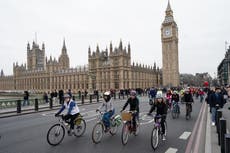
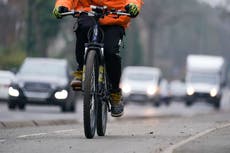
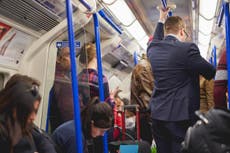
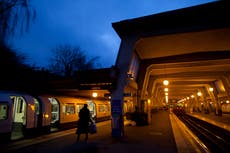
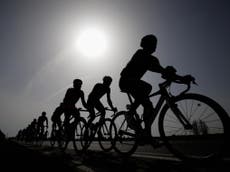
Join our commenting forum
Join thought-provoking conversations, follow other Independent readers and see their replies
Comments